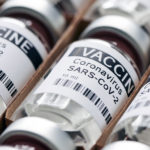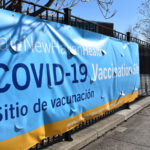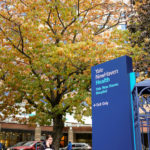Yale could vaccinate all students by end of term if J&J vaccine authorized for emergency use and state timetable holds true

Unsplash
On Monday, Gov. Ned Lamont announced an updated schedule for statewide vaccinations guided by age-based eligibility, under which Yale could theoretically begin vaccinating students on May 3. The date, however, falls on the last week of classes — a potentially complicating factor if Yale administers two-dose vaccines.
But the process could be made significantly easier if the FDA authorizes Johnson & Johnson’s single dose vaccine for emergency use. FDA staff endorsed an emergency use authorization on Wednesday, clearing the way for an official decision expected on Feb. 26.
It remains unclear whether vaccines will become available on the timetable Lamont announced. But if the federal government supplies sufficient doses, Yale has the capacity to vaccinate all students by the end of final exams and the spring term.
“If there is an Emergency Use Authorization and an adequate supply of J&J (or some other single-dose vaccine) we could vaccinate all Yale students between the week of May 3 and May 19,” Yale Health Director Paul Genecin wrote to the News. “We have considerable capacity at the Lanman Center … but again, our rate-limiting step is vaccine supply.”
Since December, Yale has been vaccinating eligible community members with vaccines from Pfizer and Moderna. These vaccines require two doses that must be administered a number of days apart — 21 days for the Pfizer vaccine and 28 days for the Moderna vaccine. Considering that most students will be leaving campus shortly after they become eligible to get the COVID-19 vaccine in Connecticut, these requirements could complicate the rollout at Yale.
The spring term is scheduled to end on May 19. If students were to receive the Pfizer vaccine in the week of May 3, they could not get the second dose until the week of May 24. Alternatively, if they receive the Moderna vaccine, they could only get the second dose the week of May 31, Genecin explained.
Yale New Haven Hospital Medical Director for Infection Prevention Richard Martinello noted that while people need to receive both vaccine doses for maximum protection, CDC guidance says people can delay the second dose for up to six weeks if necessary.
In an email to the News, Vermund explained that if someone receives their first vaccine dose at Yale, they could receive the second shot there as well if they live close to the University or from a provider in their home state or country if they leave campus in the time between doses.
The state had previously prioritized vaccinating people with health risks and jobs with high risk of coronavirus exposure. The new schedule represents a shift in Connecticut’s approach. Per Lamont’s Monday announcement, immunizations are anticipated to become available for people between the ages of 55 and 64 on March 1, people aged 45 to 54 on March 22, those aged 35 to 44 by April 12 and people aged between 16 and 34 on May 3. The updated criteria simplifies the determination of who is eligible for a vaccine and minimizes opportunities to “game the system,” according to Martinello. But it is still an area of active discussion, as the announcement has drawn pushback from essential workers and people with comorbidities.
Prior to Lamont’s announcement, the University’s public health committee, which advises COVID-19 Coordinator Stephanie Spangler, had been discussing how to determine which members of the Yale community have comorbidities, who would have soon been eligible for the vaccine during Phase 1b of the state’s prior guidelines, Martinello said. The committee has begun discussing how Yale might administer the vaccines given the age-based guidelines.
Martinello noted multiple advantages to an age-based rollout, rather than one on the basis of comorbidities. First off, most people have a driver’s license or another form of identification, so it is therefore much easier to determine someone’s age than their medical history. Under the prior guidelines, the state could have had physicians write letters attesting to people’s risk factors, but this would place a burden on healthcare providers and could lead people to take advantage of the system, Martinello said. There is not yet an exhaustive list of risk factors for severe cases of coronavirus, so it can be challenging to decide who to prioritize, he added.
Martinello also cited a study which shows that old age places people at a much greater risk of death than some health conditions which are typically considered comorbidities.
“The age-based system simplifies things in an enormous way,” Martinello said. “Otherwise, it’s really complicated to identify and communicate with people who have specific health issues.”
But after Lamont’s Monday announcement, many took to his Facebook page to express their discontent over his decision not to prioritize essential workers and those with health risks. While his schedule includes a caveat for pre-K through 12 educators — who, under current plans, would have access to vaccination in dedicated clinics starting on March 1 — several Nutmeggers were disappointed not to see essential workers prioritized in a similar way.
In an email to Yale Health members, Genecin wrote that while he recognizes the frustrations among frontline essential workers and those with chronic medical conditions in response to these announcements, Yale’s COVID-19 vaccine program is obliged to follow state guidelines.
Yale School of Public Health Professor of Health Policy A. David Paltiel said that, in his opinion, the first priority should be getting vaccines to as many people as possible. He added that this approach should be combined with culturally-sensitive messaging and listening to vulnerable populations’ distrust of the medical system, but that efforts to prioritize people with certain conditions should come second to immunizing the largest number of people possible.
“I think they may have made a wise move just saying this is simple, it’s straightforward, it’s actionable, it’s pragmatic” Paltiel said about the state’s new policy. “It would appear that Connecticut has done magnificently compared to other states.”
When Yale employees and Yale Health members become eligible for the vaccine, they will receive an invitation through MyChart. The University will cover any vaccine administration charges for Yale employees and Yale Health members who choose to get the vaccine at a site other than the Lanman Center, Genecin wrote in a Feb. 23 email to Yale Health members.
As of Feb. 24, 17.8 percent of the Connecticut population has received at least one dose of a COVID-19 vaccine.
Rose Horowitch | rose.horowitch@yale.edu
Maria Fernanda Pacheco | maria.pacheco@yale.edu












